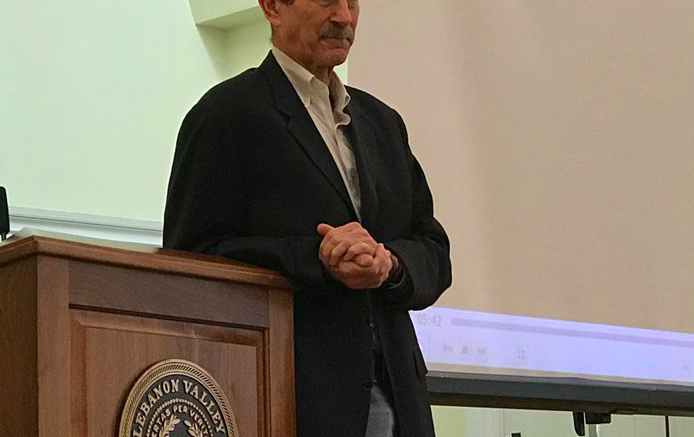By: Courtney Mengel ’19, staff writer
Frederick Foote, M.D., visited LVC to discuss the healing powers of art and nature.
Foote, a retired Navy physician, an author and director of the Warrior Poetry Project at Walter Reed National Military Medical Center hosted a lecture and writing workshop. The event was in conjunction with the Suzanne H. Arnold Art Gallery’s current exhibition “Witness to War.”
To begin the lecture, Foote read from his book, “Medic Against Bomb: A Doctor’s Poetry of War.” While he recited his poems by memory, Foote left the podium and engaged with the audience.
After the audience had a sense of what wounded soldiers endure, Foote discussed Walter Reed. The staff at the medical center have developed an interesting philosophy in regard to the way they treat their patients. They have found that conventional medicine of pills and psychotherapy and only treat one issue at a time, whereas holistic care treats the whole body. As a result, the staff combined wellness, nutrition and care with conventional medicine.
“We don’t want twelve treatments, we want one for the whole body,” Foote said.
The arts program at Walter Reed is the largest in the nation. Veterans are able to make music, create art and write poetry.
“Real healing comes from doing it yourself,” Foote said.
An important feature of Walter Reed is the Green Road Project, which is solely for pedestrians. The Green Road is the best example of a healing garden because it trusts in wild nature.
“Their encounter with wild nature is healing to PTSD because war is wild,” Foote said.
Foote then discussed frontier medical research at Walter Reed. The technology that the staff currently uses measures the progress of veterans during their treatment. Their statistics have shown that holistic care heals PTSD. Additionally, computers at Walter Reed track word patterns in patients to decide if they are mentally well enough to return home. Typically, when a patient is suicidal, psychiatrists are left to make the call. Their data has shown that psychiatrists make the right call 60% of the time, whereas the computer makes the right call 80% of the time.
“You will see more of this,” Foote said. “It’s the future.”
Foote then showed a brief video of the Green Road which incorporated quotes from people who walked through the area. After the video, Foote mentioned the ways in which civilians continue to help veterans after leaving Walter Reed. Foote wanted the audience to know that everyone has the ability to heal.
“You don’t have to be a doctor to heal PTSD,” Foote said.
